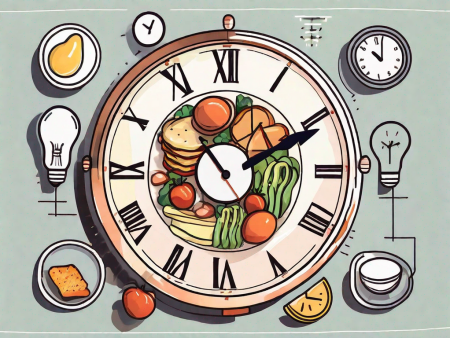Discover the crucial role hormones play in maintaining energy levels.
What Role Do Hormones Play in Maintaining Energy?
Hormones, those little chemical messengers in our bodies, play a vital role in maintaining our energy levels. They are like the superheroes of our systems, ensuring that everything runs smoothly and efficiently. But how exactly do hormones affect our energy? Let’s dive into this fascinating world and uncover the secrets of our hormonal energy boosters.

Understanding the Function of Hormones
Before we can fully comprehend the role hormones play in energy maintenance, let’s take a quick trip through Hormone 101. Our endocrine system, a network of glands, is responsible for producing and releasing hormones into our bloodstream. These hormones travel throughout our bodies, acting as chemical messengers, relaying important instructions to our organs and tissues.
But what exactly are hormones? Hormones are specialized molecules that are secreted by various glands in our body. They are like the messengers of our body, carrying important information and instructions to different parts of our body. Just like how a postal service delivers letters to different addresses, hormones deliver messages to different organs and tissues, ensuring that everything is functioning properly.
The Endocrine System and Hormonal Balance
One crucial aspect of our endocrine system is maintaining hormonal balance. Just like Goldilocks and her porridge, we need our hormones to be “just right” in order to function optimally. When our hormones are in balance, our energy levels are harmonious. However, when things go out of whack, we may experience a rollercoaster ride of energy highs and lows.
Imagine a symphony orchestra playing a beautiful piece of music. Each instrument has to be in tune and play at the right time to create a harmonious melody. Similarly, our hormones need to be in balance and work together in perfect harmony to maintain our energy levels. If one hormone is out of sync, it can throw off the entire orchestra, leading to disruptions in our energy levels.
Key Hormones Involved in Energy Regulation
So, who are the main players when it comes to hormones and energy regulation? Let’s meet a few of them:
- Insulin: The superhero hormone responsible for regulating blood sugar levels and helping us convert food into energy.
- Thyroid hormones: These metabolic powerhouses control our metabolic rate, ensuring that our energy production is firing on all cylinders.
- Adrenaline: The hormone that gives us that burst of energy in fight-or-flight situations, helping us respond to stress and danger.
- Leptin: This hormone helps regulate our appetite and energy expenditure, ensuring that we maintain a healthy weight.
Now that we’ve been introduced to some key hormones, let’s explore how they impact our metabolism and energy levels.
Insulin, the superhero hormone, plays a vital role in energy regulation. When we eat, our blood sugar levels rise, and insulin is released to help transport glucose from our bloodstream into our cells, where it can be used as energy. Without insulin, our cells would be starved of energy, and our bodies would struggle to function properly.
Thyroid hormones, on the other hand, are like the engine of our metabolism. They control our metabolic rate, which is the rate at which our body converts food into energy. If our thyroid hormones are imbalanced, it can lead to a sluggish metabolism, causing us to feel tired and lethargic.
Adrenaline, also known as the “fight-or-flight” hormone, is responsible for giving us that sudden burst of energy when we need it the most. In stressful or dangerous situations, adrenaline is released, increasing our heart rate and blood pressure, and providing us with the energy and focus to respond effectively.
Leptin, often referred to as the “satiety hormone,” helps regulate our appetite and energy expenditure. It signals to our brain when we’ve had enough to eat, helping us maintain a healthy weight. However, when leptin levels are imbalanced, it can lead to overeating and weight gain.
As you can see, hormones play a crucial role in regulating our energy levels and metabolism. They work together in a delicate balance, ensuring that our bodies have the energy they need to function optimally. Understanding how these hormones function and interact with each other can help us make informed choices about our diet, exercise, and overall lifestyle to maintain optimal energy levels.
Hormonal Impact on Metabolism and Energy
Picture your metabolism as a busy train station, and hormones as the conductors making sure everything stays on track. Without their guidance, the trains (or rather, our metabolic processes) would be in chaos!
But let’s dive deeper into the fascinating world of hormones and their impact on our metabolism and energy levels.
The Role of Insulin in Energy Production
Insulin, the superhero hormone we mentioned earlier, swoops in to regulate our blood sugar levels. When we eat, insulin signals our cells to absorb glucose from our bloodstream and convert it into energy. This keeps us energized and prevents our blood sugar from reaching sky-high levels.
But did you know that insulin also plays a crucial role in fat storage? When we consume excess calories, insulin helps store the extra energy as fat for later use. It’s like a savings account for our bodies, ensuring we have a reserve of energy when needed.
However, when insulin levels are consistently high due to a diet high in refined carbohydrates and sugar, our bodies can become resistant to its effects. This can lead to weight gain and an increased risk of developing type 2 diabetes.
Thyroid Hormones and Metabolic Rate
The thyroid gland, perched inconspicuously in our necks, produces thyroid hormones that rev up our metabolic engines. These hormones control how quickly or slowly our bodies convert food into energy. When our thyroid hormones are balanced, our energy levels are stable and our metabolism hums like a well-oiled machine.
But what happens when our thyroid hormones go haywire? Well, it can have a significant impact on our energy levels and overall well-being. When thyroid hormone production is too low (a condition known as hypothyroidism), our metabolism slows down, and we may experience fatigue, weight gain, and difficulty concentrating.
On the other hand, when thyroid hormone production is too high (hyperthyroidism), our metabolism goes into overdrive. This can lead to weight loss, increased heart rate, and feelings of restlessness or anxiety.
It’s incredible how these tiny glands and their hormones can have such a profound impact on our energy levels and overall health. So next time you think about your metabolism, remember the conductors at work, ensuring everything runs smoothly!
Hormonal Imbalances and Energy Levels
Unfortunately, our hormones are not immune to mishaps, and imbalances can wreak havoc on our energy levels. Let’s explore some symptoms and conditions related to hormonal imbalances affecting our energy.
Symptoms of Hormonal Imbalances Affecting Energy
Feeling exhausted all the time, experiencing unexplained weight gain or loss, and mood swings that rival a rollercoaster? These could be manifestations of hormonal imbalances impacting your energy. It’s essential to pay attention to these signs and consult a healthcare professional if needed.
When it comes to hormonal imbalances and energy levels, there are several other symptoms that one may experience. Some individuals may notice a decrease in their libido or sex drive, while others may struggle with insomnia or disrupted sleep patterns. Additionally, hormonal imbalances can lead to changes in appetite, causing either an increase or decrease in cravings and hunger levels.
Furthermore, hormonal imbalances can affect cognitive function and mental clarity. Many people report difficulties with concentration, memory, and overall cognitive performance when their hormones are out of balance. This can significantly impact productivity and daily functioning.
Conditions Related to Energy and Hormonal Imbalance
Hormonal imbalances can manifest in various conditions, such as hypothyroidism or hyperthyroidism, where the thyroid hormones go haywire and throw our energy levels off balance. Conditions like polycystic ovary syndrome (PCOS) or diabetes can also impact our hormones and affect our energy reserves.
In addition to these well-known conditions, there are other lesser-known hormonal disorders that can disrupt energy levels. Adrenal insufficiency, for example, occurs when the adrenal glands do not produce enough cortisol, leading to fatigue and low energy. Another condition, known as Cushing’s syndrome, results from excessive cortisol production, causing similar symptoms of fatigue and low energy.
Moreover, hormonal imbalances can be influenced by external factors such as stress, poor diet, lack of exercise, and certain medications. Chronic stress, for instance, can disrupt the delicate balance of hormones in the body, leading to fatigue and decreased energy levels. Similarly, a diet high in processed foods and sugar can contribute to hormonal imbalances and subsequent energy fluctuations.
It’s important to note that hormonal imbalances affecting energy levels can vary greatly from person to person. Some individuals may experience mild symptoms, while others may struggle with severe fatigue and a significant decline in their overall well-being. Therefore, seeking proper medical evaluation and treatment is crucial to address these imbalances and restore optimal energy levels.
Maintaining Hormonal Balance for Optimal Energy
Now that we know how important hormonal balance is for our energy levels, it’s time to explore how we can keep our hormones working harmoniously. Hormones play a crucial role in our overall well-being, affecting everything from our mood to our metabolism. When our hormones are in balance, we feel energized, focused, and ready to take on the world. However, when there is an imbalance, it can lead to fatigue, mood swings, and a general sense of unease.
So, how can we ensure that our hormones are in harmony? Let’s dive into the various lifestyle factors that influence hormonal balance and discover the medical interventions available to us.
Lifestyle Factors Influencing Hormonal Balance
Our daily habits and choices can significantly impact our hormones. Regular exercise, a healthy diet, stress management, and sufficient sleep are all factors that contribute to hormonal balance and support optimal energy levels.
Exercise is not only beneficial for our physical health but also plays a vital role in maintaining hormonal balance. When we engage in regular physical activity, our body releases endorphins, which are known as “feel-good” hormones. These endorphins help regulate our mood and reduce stress levels, ultimately promoting hormonal harmony.
Furthermore, a healthy diet rich in nutrients is essential for hormonal balance. Certain foods, such as those high in omega-3 fatty acids, vitamin D, and antioxidants, can help support the production and regulation of hormones. On the other hand, consuming excessive amounts of processed foods, sugar, and caffeine can disrupt hormonal balance and lead to energy crashes.
Stress management is another crucial aspect of maintaining hormonal balance. Chronic stress can wreak havoc on our hormones, leading to imbalances and decreased energy levels. Incorporating stress-reducing activities into our daily routine, such as meditation, yoga, or spending time in nature, can help keep our hormones in check.
Last but not least, sufficient sleep is vital for hormonal balance. During sleep, our body repairs and restores itself, including the regulation of hormones. Lack of sleep or poor sleep quality can disrupt this delicate balance, leading to hormonal imbalances and a subsequent decrease in energy levels. Prioritizing a consistent sleep schedule and creating a relaxing bedtime routine can greatly contribute to hormonal harmony.
Medical Interventions for Hormonal Imbalance
If hormonal imbalances persist despite our best efforts, medical interventions might be necessary. Hormone replacement therapies, medication, or other treatments prescribed by healthcare professionals can help restore the balance and get our energy levels back on track.
Hormone replacement therapies involve supplementing or replacing hormones that are deficient or imbalanced in the body. This approach aims to mimic the natural hormonal levels and alleviate symptoms associated with hormonal imbalances. It is crucial to consult with a healthcare professional to determine the most suitable hormone replacement therapy for individual needs.
In some cases, medication may be prescribed to address specific hormonal imbalances. For example, certain medications can help regulate thyroid hormone levels in individuals with hypothyroidism, a condition characterized by an underactive thyroid gland. These medications work by supplementing or stimulating the production of thyroid hormones, thus restoring hormonal balance and improving energy levels.
Additionally, other treatments, such as lifestyle modifications, dietary changes, or alternative therapies, may be recommended to support hormonal balance. These treatments can vary depending on the underlying cause of the hormonal imbalance and should be discussed with a healthcare professional.
By understanding the lifestyle factors that influence hormonal balance and the medical interventions available, we can take proactive steps to optimize our energy levels. Whether it’s through adopting healthy habits or seeking professional guidance, maintaining hormonal harmony is key to feeling our best and living life to the fullest.
The Future of Hormone Research in Energy Management
As with any scientific field, hormone research continues to evolve and uncover new insights. Let’s take a peek into the crystal ball and see what the future holds for hormonal studies and its potential impact on energy-related health issues.

Emerging Trends in Hormonal Studies
Advancements in technology and research methods are allowing scientists to delve deeper into the mysteries of hormones and their connection to energy. From studying the intricate signaling pathways to discovering new hormonal players, the horizon is brimming with exciting possibilities.
Potential Implications for Energy-Related Health Issues
Understanding the intricate dance between hormones and energy can shed light on various health conditions. Insights gained from hormone research may lead to innovative treatments, preventative strategies, and personalized approaches to managing energy-related health issues.
In conclusion, hormones are like the conductors of our bodily symphony, ensuring that our energy levels hit all the right notes. From regulating blood sugar levels to revving up our metabolic engines, hormones play a crucial role in maintaining our energy reserves. So, let’s embrace the world of hormones, keep them in balance, and channel our inner energy superheroes!








Hello! Do you know if they make any plugins
to help with SEO? I’m trying to get my blog to rank for some targeted
keywords but I’m not seeing very good results. If you know of any please share.
Many thanks! I saw similar blog here: Eco product
Each age of particular person is aware of how to use.
sugar Defender reviews For several years, I
have actually battled unforeseeable blood sugar
swings that left me really feeling drained and inactive. Yet
given that incorporating Sugar my energy levels are currently stable and regular, and I no more hit a wall in the afternoons.
I appreciate that it’s a mild, all-natural technique that doesn’t
featured any type of undesirable negative effects.
It’s truly changed my every day life.